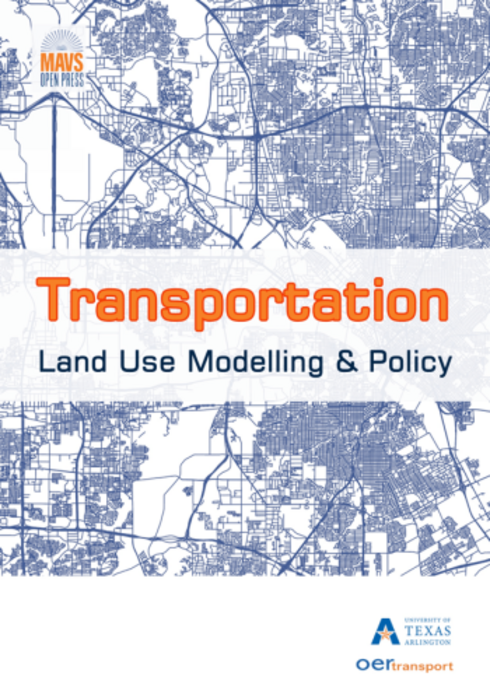
Transportation Land Use Modeling and Policy (TLUMP)
No ratings
Qisheng Pan, University of Texas - Arlington
Soheil Sharifi-Asl, University of Texas - Arlington
Copyright Year:
Publisher: Mavs Open Press
Language: English
Formats Available
Conditions of Use
![]() Attribution-NonCommercial-ShareAlike
Attribution-NonCommercial-ShareAlike
CC BY-NC-SA
Table of Contents
- Preface
- About the Authors
- About the Institution
- Copyright
- Acknowledgements
- Part I: Introduction and History of Transportation Planning and Modeling
- Part II: Integrated Land Use-Transportation Modeling
- Part III: Travel Demand Modeling
- Image Credits
- Derivative Notes
About the Book
Transportation Land Use Modeling and Policy is an open educational resource (OER) that offers a thorough exploration of various approaches and frameworks for modeling the complex relationship between land use and transportation, with a focus on scenario-based analysis for issues such as equity, environmental impact, and other critical transportation policies.
The textbook begins by providing an overview of the current urban transportation landscape, highlighting ongoing challenges like transportation equity. It then introduces foundational theories related to land use and transportation, setting the stage for an in-depth examination of different modeling approaches. Using case studies and real-world examples, primarily from North America, the book demonstrates how these models explain and predict the relationship between land use (residential, economic, industrial activities) and transportation (accessibility).
After reviewing existing integrated land use and transportation models and discussing the future direction of integrated land use and transportation planning, the latter part of the book delves deeper into travel demand modeling (TDM) practices. It highlights traditional methods like the four-step model and provides a brief overview of newer techniques such as activity- based and agent-based models.
This textbook is part of a six-volume series produced under the grant OERTransport: Enabling Transportation Planning Professional Advancement awarded to the University of Texas-Arlington (UTA) in consortium with California Polytechnic State University (Cal Poly) and the University of South Florida (USF). It was developed under an Open Textbooks Pilot grant from the Fund for the Improvement of Postsecondary Education (FIPSE), U.S. Department of Education. However, its contents do not necessarily represent the policy of the Department of Education, and no endorsement by the Federal Government should be assumed.
About the Contributors
Authors
Professor Qisheng Pan’s research interests span transportation and infrastructure planning, economic impact analysis, and applications of Computing Technology and Geographic Information Systems (GIS) in urban studies. His research on infrastructure planning explores the economic impacts of infrastructure facilities, infrastructure management, and the spatial layouts of urban infrastructures for significant real estate developments. His transportation-related research concentrates on freight transportation modeling, socio-economic impacts of transportation projects, transit accessibility measures, and environmental effects of transportation.
Soheil Sharifi-Asl is a Ph.D. student and graduate research assistant at the College of Architecture, Planning, and Public Affairs. Holding a master’s and bachelor’s degree in urban planning from the University of Tehran and completing his dissertations in transportation, Soheil is interested in urban transportation, transportation equity, and transportation infrastructure planning, public transit planning and modeling, transportation big data, and statistical models.
